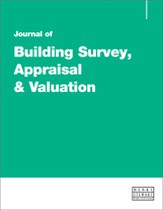Water damage restoration, structural drying and remediation of damp issues in UK properties : A comprehensive review
Abstract
Water damage is a pervasive issue in the UK, with adverse effects on property structures and indoor air quality. This paper provides a comprehensive review of water damage restoration, structural drying and remediation techniques tailored to UK properties. It discusses the causes of water damage, including flooding, leaks and dampness, and explores the principles and methods of effective restoration and remediation. Special attention is given to the unique challenges and considerations faced by property owners, contractors and restoration professionals in the UK context.
The full article is available to subscribers to the journal.
Author's Biography
Alan James IICRC WRT/ASD has been working in the field of water damage restoration for the past 14 years, specialising in the supply of equipment and delivering aftersales training and support for water damage technicians around the world. Sustainable repair and restoration are at the forefront of Alan’s daily business, with technologies such as remote monitoring and environmentally focused climate control solutions providing a platform to help minimise the carbon footprint of the sector as a whole.
Citation
James, Alan (2024, September 1). Water damage restoration, structural drying and remediation of damp issues in UK properties : A comprehensive review. In the Journal of Building Survey, Appraisal & Valuation, Volume 13, Issue 2. https://doi.org/10.69554/VWJQ8745.Publications LLP
